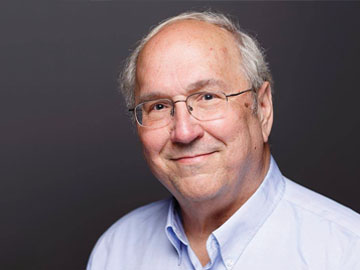 Stephen A. Burns
Stephen A. Burns
Understanding Ethics in Publishing
Ethics has implications in all aspects of our lives—and scientific publishing is no exception. The pressures to publish can lead to shortcuts such as plagiarism and data manipulation; the pressures of competition can lead to implicit or explicit bias; the pressure to achieve a high Impact Factor can lead to manipulation of the peer review system and citation practices.
To provide a better grip on these issues, Optica and Optica Publishing Group sponsored a recent webinar, “Understanding Ethics in Publishing,” featuring Stephen A. Burns, the chair of Optica Publishing Group’s Editorial Ethics Subcommittee. Burns offered insight on the ethical obligations of all participants in the publishing process, summarizing some of the types of misconduct encountered by journal editors as well as how these are dealt with to ensure the reliability of the scientific record. Optica Publishing Group Executive Editor Alison Taylor and Senior Publisher Kelly Cohen presented two case studies that participants discussed in breakout groups and summarized at the end of the session. See the recorded webinar at optica.org/ethics_webinar.
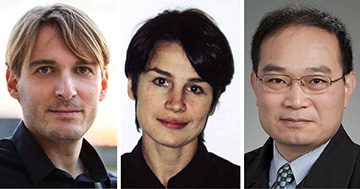 Andrea Alù (left), Olga Korotkova (middle), Ruikang Wang (right)
Andrea Alù (left), Olga Korotkova (middle), Ruikang Wang (right)
Three New Editors-in-Chief Named
Optica Publishing Group is pleased to announce the appointment of new editors-in-chief of three of the society’s premier journals.
Optica Fellow and 2013 Adolph Lomb Medal recipient Andrea Alù (Optical Materials Express) is the founding director of the Photonics Initiative at the CUNY Advanced Science Research Center, Einstein Professor of Physics at the CUNY Graduate Center, and a professor of electrical engineering at The City College of New York, USA. He previously served as an associate editor for Optics Express for six years.
Optica Fellow Olga Korotkova (JOSA A), a professor in the physics department at the University of Miami, USA, has been active on various Optica conference program committees, and also served for six years as a topical editor for Optics Letters and as an associate editor for OSA Continuum (now called Optics Continuum).
Optica Fellow Ruikang Wang (Biomedical Optics Express) is a professor with appointments in bioengineering and ophthalmology and directs the Biophotonics and Imaging Laboratory at the University of Washington, USA. He served as an associate editor on the founding editorial board of Biomedical Optics Express and has been active on program committees for Optica’s Biophotonics Congress.
![]() Mona Jarrahi.
Mona Jarrahi.
Jarrahi Wins Prestigious Engineering Prize
Congratulations to Optica Fellow Mona Jarrahi, University of California, Los Angeles, USA, who has been awarded the 2021 A F Harvey Engineering Research Prize from the Institution of Engineering and Technology (IET) in the United Kingdom. The prize goes to Jarrahi in recognition of her “outstanding contributions to research in the field of radar and microwave engineering,” particularly in microwave and terahertz optoelectronic devices to facilitate communications, remote sensing and imaging in “under-utilized parts of the electromagnetic spectrum.”
The Harvey Prize—awarded to “phenomenal researchers working in the fields of radar and microwave, lasers and optoelectronics, or medical engineering”—carries a cash award of £350,000 (approximately US$467,000). Jarrahi will use those funds to advance her team’s research in the building blocks of next-gen terahertz systems. She will present her research in a virtual lecture hosted by the IET on 17 March 2022; more information is available at theiet.org.
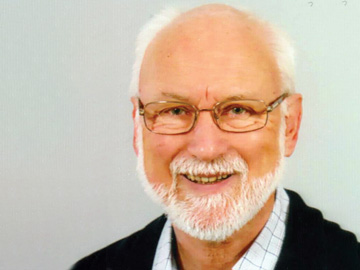 Meint Smit.
Meint Smit.
2022 John Tyndall Award
Optica and the IEEE Photonics Society have named Meint Smit, Eindhoven University of Technology, Netherlands, the 2022 John Tyndall Award recipient. Smit was cited for “leadership in building a photonic integration ecosystem, and pioneering contributions to key photonic devices including the arrayed waveguide grating.”
A top honor in the fiber optics community, the Tyndall award recognizes an individual who has made pioneering, highly significant or continuing technical or leadership contributions to fiber optic technology. It is named after John Tyndall, the 19th-century scientist who was the first to demonstrate the phenomenon of total internal reflection.
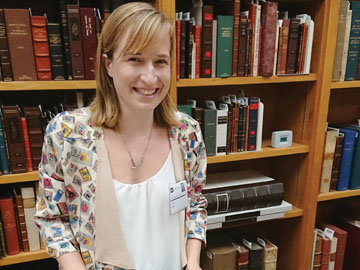 Alice White.
Alice White.
DiversiWiki Edit-a-Thon
Wikipedia is the fifth-most-visited website on the planet—so representation there matters. Unfortunately, groups underrepresented in science also are underrepresented on Wikipedia. To help address that disparity, Optica organized a virtual “edit-a-thon” on 3 December 2021, in which a group of online participants learned how to strengthen existing pages or create new content on underrepresented people in science for this important platform.
The event kicked off with a short training session, in which Alice White, the digital editor and Wikipedian-in-residence at the Wellcome Trust, UK, walked the online participants through some tips on how to begin and on creating strong pages. Then, the participants spent two hours building or editing Wikipedia pages, translating content to strengthen weak or “stub” pages in languages other than English, and creating content for Simple English Wikipedia, a project aimed at children and adults who are learning English.
Since 2019 Optica has organized six DiversiWiki programs, resuting in 57,000 words added, 624 references added, 241 articles edited and 25 articles created on Wikipedia—with more than a million views on the affected pages. Additional sessions are coming in 2022; visit optica.org/diversiwiki for more information.
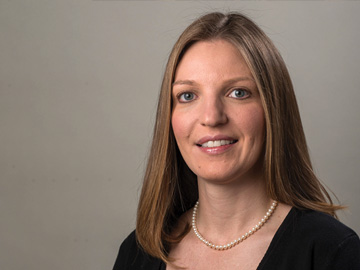
Jessica DeGroote Nelson.
Spotlight—Women in Industry
Optica Corporate Membership’s Women in Industry feature spotlights both emerging and seasoned Optica corporate members by engaging with them in a short Q&A. This month, Jessica DeGroote Nelson, Director of Technology and Strategy, Optimax Systems, Inc., says, “It is OK to reinvent yourself. I recently overheard someone tell a group of students, ‘don’t be afraid to reinvent yourself every five years.’ I think this is excellent advice, as life should be all about following your passions and your dreams, and it is OK if those dreams change over time!” Read more at optica.org/1221_imnews/#5.
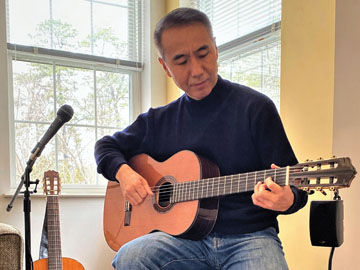
Yi Cai.
Optica Fellow Stories: Yi Cai
The stars in the night sky inspired 2020 Fellow Yi Cai to pursue science. He has found similar stimulation in unlikely places throughout his career, like the sound of an airplane or music played on a college campus. Yi encourages young scientists to stay curious and preserve their imaginations. Learn more about Yi and other Optica Fellows at optica.org/fellowprofiles.

[Getty Images]
Optics and Photonics Market: What’s Ahead
As 2022 dawned, the world economic outlook remained obscure, with headlines warning of ongoing pandemic-related supply-chain disruptions, incipient inflation, new viral variants, a potentially overpriced stock market and more. What does all of this mean for the optics and photonics industry as it moves through the coming year? Optica Senior Industry Advisor Tom Hausken provided some answers and best-guesses in a webinar on why the industry has done so well amid the pandemic so far—and what to expect for the market in 2022.
In the talk, Hausken noted that the industry fared better than the most dire predictions suggested in the pandemic’s first two years, as key factories remained open worldwide, government stimulus plans helped sustain demand and company valuations on stock markets soared. For global photonics production, “there was a dip [in 2020] compared with what you might have expected in a normal year,” he said, “but not as much as you might have thought, given the scale of this phenomenon that happened globally.” As a result, he says, as 2022 begins “it looks like we’ll be approximately on track with where we would have been [without the pandemic]—and that’s better than the US economy.”
Hausken did acknowledge that shortages of parts and workers will continue into 2022, and “that’s a big concern.” He also discussed the prospects for a number of hot areas, such as integrated photonics, biomedical sensors (including for COVID-19), AR/VR, quantum, metamaterials and lidar.
To view the recorded webinar, visit optica.org/1221_market_update.
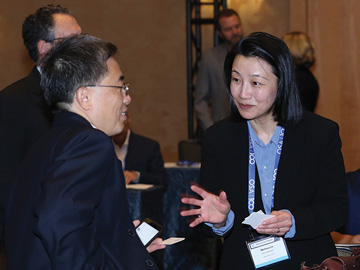
Attendees at OFC’s 2019 Executive Forum [Image: OFC]
2022 Executive Forum at OFC
Optica’s Executive Forum, at the OFC Conference, is the premier industry event for leaders in optical networking and communications. The forum features C-level panelists in an informal, uncensored setting, discussing the latest issues facing the industry. In the session coming on 07 March in San Diego, CA, USA, leaders from top companies will discuss critical technology advancements and business opportunities that will shape the network in 2022 and the future. It’s a great opportunity to tap the wisdom of the industry’s senior execs—to learn, connect and inquire. To register, visit optica.org/2022_exec_forum.
Thank You, Volunteers
Thank you to the Optica Meetings Council members who concluded their terms in December 2021: Marco Arrigoni, Coherent Inc., USA; and Marija Furdek, Chalmers Tekniska Högskola, Sweden.
Sterling J. Backus, Thorlabs Laser Division Boulder, USA; Liangcai Cao, Tsinghua University, China; and Abbie T. Watnik, US Naval Research Laboratory, USA, will be joining the Meetings Council as new members.
Continuing members include Steve Cundiff, University of Michigan, USA (Chair); Jens Biegert, ICFO–The Institute of Photonic Sciences, Spain (Chair-Elect); Rama Chellappa, Johns Hopkins University, USA; Stephen H. Foulger, Clemson University, USA; Na Ji, University of California Berkeley, USA; and Gabrielle M. Thomas, EurA AG, Germany.
Thank You, Volunteers
We are happy to announce that the following individuals were recently appointed as new editors: Applied Optics—Muhammad Nadeem Akram, University of Southeast Norway, Norway (as Deputy Editor). Biomedical Optics Express—Junle Qu, Shenzhen University, China. JOSA B—Quan Sheng, Tianjin University, China. Optica—Laura Waller, University of California, Berkeley. Optics Express—Hannah Joyce, University of Cambridge, UK; Thomas Murphy, University of Maryland, College Park, USA (as Senior Deputy Editor); Fabian Rotermund, KAIST, South Korea (as Deputy Editor); Andreas Velten, University of Wisconsin-Madison, USA. Optics Continuum—Jacquiline Romero, University of Queensland, Australia. Photonics Research—Nan Chi, Fudan University, China; Chao Lu, The Hong Kong Polytechnic University, Hong Kong.
We would like to thank the following editors for agreeing to serve a second term: JOSA A—Jinli Suo, Tsinghua University, China. Optics Express—Javier Hernandez-Andres, University of Granada, Spain; Vladislav Yakovlev, Max Planck Institute of Quantum Optics, Germany. Optics Letters—Francesca Parmigiani, Microsoft Research Cambridge, UK; Andriy Shevchenko, Aalto University, Finland; Quing (Ching) Zhu, Washington University, St. Louis, USA.
We would like to thank the following editors, who have recently finished their terms, for their years of service: Applied Optics—Geoffrey Cranch, Naval Research Laboratory, USA (as Deputy Editor); Mohammad Sabaeian, Shahid Chamran University of Ahvaz, Iran. JOSA B—Wei Shi, Tianjin University, China. Optics Express—Chris Dainty, UCL, UK (as Senior Deputy Editor); Christian Kränkel, University of Hamburg, Germany; Changhui Li, Peking University, China; YongKeun (Paul) Park, KAIST, South Korea; Clara Saraceno, Ruhr University Bochum, Germany; V R Supradeepa, Indian Institute of Science, India. Optics Letters—Gabriella Cipparrone, University of Calabria, Rende, Italy; Goëry Genty, Tampere University of Technology, Finland; Osamu Matoba, Kobe University, Japan.
